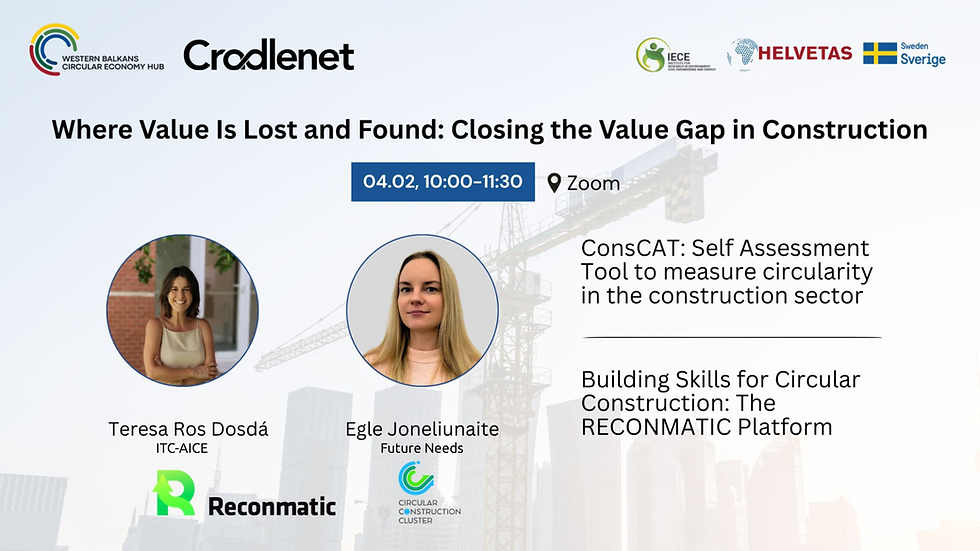RECONMATIC Unveils Insights on Circular Economy Implementation in European Construction
- Jan 4, 2024
- 3 min read
Updated: Jan 9, 2024
An initial study on the implementation of circular economy principles has been successfully concluded within the framework of the RECONMATIC project. The primary objective of this activity is to establish baselines across different European countries participating in the initiative, including Cyprus, the Czech Republic, Greece, Italy, Spain and the United Kingdom. This comprehensive assessment has resulted in the creation of country profiles, which will serve as reference points for the subsequent development of a digital assessment tool and impact evaluation for the six demonstrators envisioned within the RECONMATIC project.
The study methodology involved the formulation of an array comprising 50 key performance indicators (KPIs), categorized into six distinct sections: governance, managerial, technological, economic, environmental, and social. These indicators are qualitatively designed, presenting five levels of performance for ease of presentation and comparison. The calculation of these indicators relied on data obtained from a thorough literature review and surveys conducted with various stakeholders involved in the construction process. Subsequently, the country profiles were meticulously created and presented, exemplified in Figure 2.

Figure 1 . Diagram showing the different stages of this study and their relationship.
Challenges faced
The calculation of the country profiles highlighted several challenges. The insufficient environmental data in national statistics posed challenges in calculating various KPIs. This limitation hindered the development of comprehensive results, particularly in specific areas reliant on statistical data from different countries. Variations in data sources and structures across countries also created obstacles. Inconsistencies in data calculation methods and criteria for disaggregation, such as in waste streams or recovery strategies, necessitated adjustments.
Additionally, identifying a consistent reference period proved challenging. Delays of up to five years in accessing the most recent data undermine the representation of current circumstances. Other difficulties arose in sampling for participant identification due to limited access to national stakeholders' databases, which were often non-existent.
Moreover, the selection of the KPIs was contingent on data availability. Some KPIs were either omitted from the list or modified during the calculation process due to data limitations. Nevertheless, all KPIs were treated equally, without differentiation based on their relevance or impact on the implementation of a circular economy. This approach resulted in, for instance, giving more significance to Construction and Demolition Waste (CDW) statistics with seven KPIs than to assessment and certification processes, which only had two KPIs.

Figure 2. Part of country profile for Greece, Governance section.
A last important remark is that despite the time and effort allowed for distributing the surveys, the number of completed questionnaires was low relative to the targeted audience, leading to a high level of uncertainty and low representativity of the study results.
Next Steps & Recommendations
Although improvements are still needed, the presentation of these country profiles serves as a foundational step towards understanding the implementation of circular economy practices in the construction industry across the participating European countries. The report including them concludes with recommendations and suggested improvements regarding the KPIs used, the availability of statistics and databases and the necessity for a clear definition of concepts and standardisation process, to develop a methodology for the assessment of the circular economy practices by countries and organisations.
Additionally, this report on the countries’ profiles establishes parameters for comparison and analysis of the evolution over time and the impact of the RECONMATIC project, which will become more tangible with the impending creation of the digital assessment tool for circularity in work package 6.
This initial study is expected to inform other work packages by providing a compilation of information and documentation about current practices in the sector and the existing regulatory framework. Spearheaded by the University of Salford, this task has been accomplished with invaluable contributions from partners across different countries, contributing to this comprehensive compilation.

Figure 3. Juan A Ferriz-Papi has led this study from the University of Salford.

Figure 4. Mahmoud Alhawamdeh has participated as a researcher from the University of Salford.
As the first completed deliverable within the RECONMATIC project, this study is currently under review. Once approved by the Commission, the report will be accessible on our website and will be promoted through RECONMATIC's social media channels, ensuring widespread dissemination of insights garnered from this significant milestone in our pursuit of sustainable construction practices.
If you are an architect, designer, client, material manufacturer, contractor, waste manager or similar, we invite you to support our research by participating in the development of our guidance tool for implementing circularity in construction processes that meet your needs. Join one of our six workshops that will be organised in January and February of 2024, to validate our approach to the tool development followed in the first phase.
Stay tuned and subscribe to our newletter for updates as we unfold a deeper understanding of circular economy implementation in the European construction landscape.


